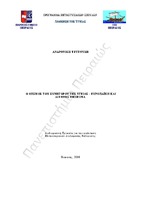Ο θεσμός του συνήγορου της υγείας - ευρωπαϊκή και διεθνής εμπειρία
The institution of health services ombudsman - european and international experience

Προβολή/
Θεματική επικεφαλίδα
Ombudsman ; Διαμεσολάβηση (Διεθνές δίκαιο) ; Πολιτική υγείας ; Health policyΠερίληψη
Η παρούσα Διπλωματική Εργασία έχει ως θέμα την παρουσίαση του θεσμού του Συνηγόρου της Υγείας τόσο ως ένα ευρωπαϊκό όσο και ως ένα διεθνές φαινόμενο. Μέσα από την παρουσίαση των αρμοδιοτήτων, των δράσεων και των παρεμβάσεων των θεσπισμένων Διαμεσολαβητών στον τομέα υγείας τόσο στην Ελλάδα όσο και στην αλλοδαπή (Ηνωμένο Βασίλειο, Γαλλία και Αυστραλία), επιχειρείται να γίνει μια συγκριτική μελέτη και να εξαχθούν συμπεράσματα σχετικά με την αποτελεσματικότητα του θεσμού στα κράτη όπου εφαρμόζεται, να προσδιοριστούν μειονεκτήματα και να υιοθετηθούν ορθές πρακτικές. Τέλος, θα υποβληθούν προτάσεις προς ενίσχυση του θεσμού τόσο στην Ελλάδα όσο και γενικότερα. Οι Ανεξάρτητες Αρχές είναι ιδιαίτερα διαδεδομένες παγκοσμίως και έχουν ως αποστολή την προστασία των δικαιωμάτων των πολιτών, την καταπολέμηση της κακοδιοίκησης και την τήρηση της νομιμότητας. Η προστασία της υγείας ως ενός σημαντικού κοινωνικού δικαιώματος δε θα μπορούσε να μην αποτελέσει αντικείμενο αρμοδιότητας των Ανεξάρτητων Αρχών. Η θέσπιση εξειδικευμένων Διαμεσολαβητών και Επιτρόπων Υγείας ή ενός μόνο εθνικού Διαμεσολαβητή για την προστασία των ανθρωπίνων δικαιωμάτων, έχει αποτελέσει ζήτημα συζητήσεων και διαφωνιών. Ανεξάρτητα από την επιλογή του εκάστοτε κράτους, η προσφυγή στα δικαστήρια είναι χρονοβόρα και δαπανηρή, ενώ οι υπηρεσίες του Διαμεσολαβητή παρέχονται δωρεάν και συνήθως οι φορείς αποδέχονται τις συστάσεις του παρά το μη δεσμευτικό τους χαρακτήρα. Οι Διαμεσολαβητές Υπηρεσιών Υγείας διαθέτουν ένα ευρύ φάσμα αρμοδιοτήτων και εκτός από τη διερεύνηση των αναφορών που τους υποβάλλονται, μπορούν να προβαίνουν σε αυτεπάγγελτες έρευνες και να εντοπίζουν οργανωτικές και λειτουργικές δυσλειτουργίες, ανεπάρκειες του συστήματος υγείας και πρόνοιας καθώς και νομοθετικά κενά. Εισηγούνται μεταρρυθμίσεις, τρόπους βελτίωσης των πρακτικών και διαδικασιών και της επικοινωνίας με τους χρήστες των υπηρεσιών υγείας. Τέλος, μέσα από τις παρεμβάσεις των Διαμεσολαβητών και Επιτρόπων επιτυγχάνεται η παροχή ποιοτικών υπηρεσιών υγείας, εξοικονομούνται πόροι και βελτιώνεται το επίπεδο υγείας του πληθυσμού.


